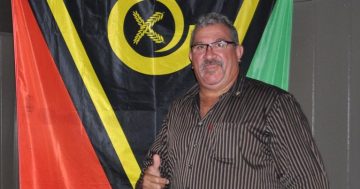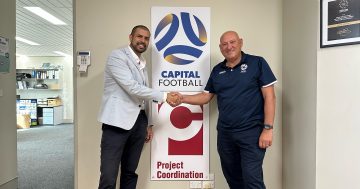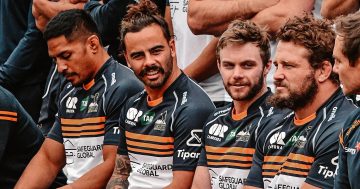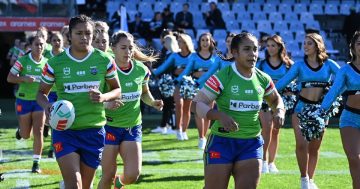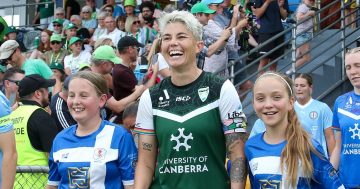
Raiders CEO Don Furner, Brumbies General Manager Commercial, Gavin Hunt and Capital Football CEO Phil Brown agree community sport should bounce back. Image: Region Media.
Hard hit by lockdowns, most ACT sport is now on pause. Region Media’s Tim Gavel spoke to three local sports leaders to find out what sport is going through at the moment and what the future might hold.
Raiders CEO Don Furner says with local sport stopped, sporting organisations were now in uncharted waters.
“With the NRL and community sport waiting to start, and our under-20s, under-18s and under-16s cancelled for the season, it is very strange around here at the moment,” Furner said.
Capital Football CEO, Phil Brown said all levels of football have shut down until at least 31 May but they are hoping to get back on track with a modified structure from July if it is safe to do so.
“Community sport is important, it brings joy to the lives of so many people, we would love to get back out there,” Brown said.
Rugby Union has been impacted on all levels, from community sport through to the professional and international level, according to Brumbies General Manager of Commercial Operations Gavin Hunt.
“COVID-19 is having a significant impact from juniors through to the Wallabies’ tests in July. While our commercial partners are being very supportive, we are aware that their businesses are hurting at the moment, too. Everyone’s cash flows are being impacted by an event few could have planned for. We are tightening our belts and cutting costs, so that we can be in the best shape we can on the other side,” Hunt said.
What's ahead for local sport when the COVID shutdown ends?
The COVID-19 pandemic has created great uncertainty in our community and local sport is no exception, with much of it now on hold. Tim Gavel is with three of the region's top sporting administrators from Brumbies Rugby, Canberra Raiders and Capital Football – Official as they reflect on the impact of the shutdown and begin to look to the future.
Posted by The RiotACT on Wednesday, April 29, 2020
Phil Brown says 40 per cent of Capital Football income comes from player registrations so a reduced season along with reduced revenue from corporate partners will have a significant impact on their books.
“Small businesses support our local volunteer clubs but it is going to be difficult for them over this period, too.”
Gavin Hunt says while many players had already registered for the season, registrations have been paused for now but they are hoping to get some sort of competition up and running.
“We are trying to have a look at what the back end of the season may look like and if we have access to playing fields. This may encroach on summer sports so we need to negotiate with them. We will try to make the best out of what we can.”
Don Furner is optimistic about the future of grassroots, community sport saying, in the long term, it should not change too much. Professional sport, however, will be different.
“Income like gate receipts and memberships have been around a long time and should not change much but it will be harder to maintain staffing levels and player salaries. There will be lots of expenses we will need to review, like when we travel to away games we may have to stay one night before a game instead of two. For the next couple of years, many things will be simply unaffordable.”
Gavin Hunt agreed that community sport should look the same in the coming years.
“Community sport is largely run by volunteers and will continue to do so. While local business are doing it tough at the moment, it will build back up. Many clubs may not be too affected by the downturn in revenue and will be back next year.
“Super Rugby is going to look very different going forward. There is a lot of modelling being done to see what that may look like. We have to understand things like the effect of airfares that may skyrocket. But it is a good chance for a reset and see what the game can look like in the coming years.”













